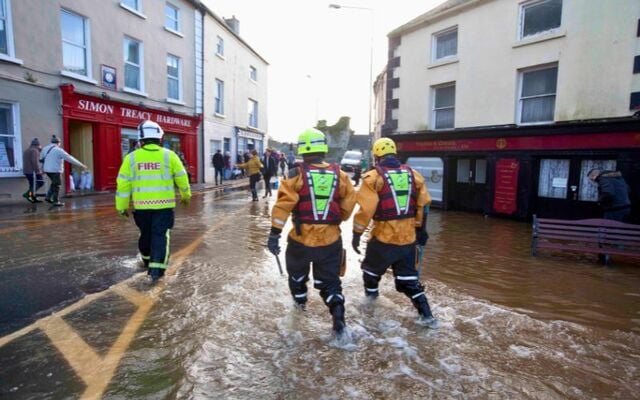Extreme wind, flooding, and heat have been flagged in the first comprehensive assessment of where, when, and how climate risks are likely to impact Ireland over the coming decades.
The State’s environmental watchdog, the Environmental Protection Agency (EPA), has warned of 115 risks associated with a projected increase in the severity and frequency of extreme weather events through 2030, 2050, and 2100.
It said these would affect the country’s energy, transport, communications, water security, public health, food production and supply, and ecosystems.
In a new report, the EPA said urgent action was particularly badly needed over the next five years to prevent disruption and damage to communications and energy distribution infrastructure, due to extreme wind.
It said similarly rapid action was needed to avoid disruption and damage to buildings and transport infrastructure due to extreme wind, coastal erosion, and coastal flooding.
Also requiring swift attention were risks to the built environment and human health from flooding and heat, the EPA said.
Laura Burke, EPA director general, said: "We know that Ireland is being impacted by climate change already.
"Recent events, such as Storms Darragh and Éowyn, demonstrated how damage to critical infrastructure, such as energy, water supply, transport and communications networks, in turn gives rise to impacts on human health, biodiversity and the financial system."
EPA director Dr. Eimear Cotter said: "The National Climate Risk Assessment underscores the need for immediate action in the next five years to enhance the resilience of Ireland’s critical infrastructure to climate change.
"The risks with the most consequential and highest urgency ratings relate to extreme wind, coastal erosion and coastal flooding."
The report states: "Ireland’s climate is changing in line with global trends. These changes are unprecedented, and it is now established fact that human activities are resulting in the warming of our climate system.
"Over the last century, Ireland’s climate has become warmer, with patterns of precipitation changing and rising sea levels. These changes in our average climate conditions are also being reflected in changes in the frequency and severity of extreme weather events.
"Changes to Ireland’s climate will continue and intensify, with far-reaching consequences for its environment, economy, and society."
The EPA warned climate change would drive up insurance costs, reduce tax payments to the State, and cause businesses to struggle. Increases in rainfall and flooding would pose significant risks to citizens’ physical and mental health.
Flooding can cause injuries, fatalities, PTSD, depression, and anxiety. Extreme heat also poses health risks, particularly to vulnerable groups such as older adults, children, and people with chronic illnesses.
It can cause heat exhaustion, heat stroke, and dehydration, while warmer temperatures extend the spread of diseases.
Wildlife will also be affected, with an increasing risk of forest fires, deteriorating quality of freshwater due to flooding and droughts, a degradation in habitats and a risk of invasive species.
The EPA also cited a risk of reduced crop yields. It warned of ‘cascading’ impacts, such as a loss of electricity affecting water supply, transport, food production, healthcare and water security.
Predictions in the report, obtained from Met Éireann and other agencies, pointed to a national mean temperature rise of 1.5°C by the 2050s, with the mid-east experiencing the largest increase of up to 2C.
It said the upsides of climate change include the possibility of increased tourism, as well as increased hydro-power generation, more shellfish and a greater diversity of marine species.
*This article was originally published on Extra.ie.




Comments